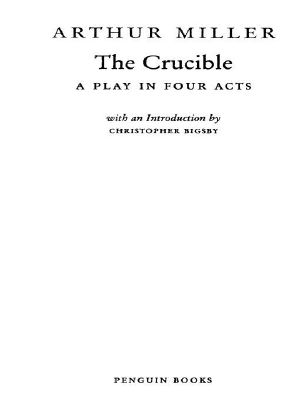The Crucible

- Authors
- Arthur Miller
- Publisher
- Penguin Classics
- Tags
- general , literary , fiction , classics , drama , massachusetts , american , witchcraft , historical drama , salem , trials (witchcraft) , salem (mass.) , salem (mass.) - history - colonial period; ca. 1600-1775
- ISBN
- 9780142437339
- Date
- 2003-11-15T05:00:00+00:00
- Size
- 0.20 MB
- Lang
- en
Review
Under Martin Jenkins' direction, the brilliant L.A. Theatre Works actors give
performances that are intense, chilling and deeply moving. --_Tom Jacobs, The
Daily News, April 10, 1988_[HTML_REMOVED][HTML_REMOVED]At once an allegory of the 1950s' anti-
communist witch hunts and a spotlight on seventeenth-century witch trials in
Salem, Massachusetts, this play shows how ignorance and good intentions can
interweave to destroy lives. The star-studded cast ratchets the tension to a
disturbing level as the town disintegrates. The young girls playing at
witchcraft shriek in irregular counterpoint to the quiet, terrifying judgments
rendered by Reverend Harris (Michael York), and doubt is ever more audible in
the voice of Reverend Hale (Richard Dreyfuss). Most moving is Stacy Keach as
John Proctor, who fights to salvage some good from the trials that destroy
Salem. --AudioFile Magazine
At once an allegory of the 1950s' anti-communist witch hunts and a spotlight
on seventeenth-century witch trials in Salem, Massachusetts, this play shows
how ignorance and good intentions can interweave to destroy lives. The star-
studded cast ratchets the tension to a disturbing level as the town
disintegrates. The young girls playing at witchcraft shriek in irregular
counterpoint to the quiet, terrifying judgments rendered by Reverend Harris
(Michael York), and doubt is ever more audible in the voice of Reverend Hale
(Richard Dreyfuss). Most moving is Stacy Keach as John Proctor, who fights to
salvage some good from the trials that destroy Salem. --AudioFile Magazine
Product Description
A classic of the American Theatre - Arthur Miller's tense, ingeniously multi-
layered drama of principle and paranoia.
The place is Salem, Massachusetts in 1692, an enclave of rigid piety huddled
on the edge of a wilderness. Its inhabitants believe unquestioningly in their
own sanctity. But in Arthur Miller's edgy masterpiece, that very belief will
have poisonous consequences when a vengeful teenager accuses a rival of
witchcraft and then when those accusations multiply to consume the entire
village.
First produced in 1953, at a time when America was convulsed by a new epidemic
of witch hunting, The Crucible brilliantly explores the threshold between
individual guilt and mass hysteria, personal spite and collective evil. It is
a play that is not only relentlessly suspenseful and vastly moving, but that
compels listeners to gather their hearts and consciences in ways that only the
greatest theater ever can.
A full-cast performance by The Repertory Theatre of Lincoln Center featuring
Robert Foxworth, Pamela Payton-Wright, Stuart Pankin, and Jerome Dempsey and
cast.
Arthur Miller was born in New York City in 1915. His first theatrical success
occurred in 1947 with All My Sons, which earned him the Drama Critic's Circle
Award. In 1949, Death of a Salesman was given the Pulitzer Prize and the Drama
Critic's Circle Award. The Crucible won a Tony Award four years later. His
other plays included A View from the Bridge, The Price, After the Fall,
Incident at Vichy, The American Clock, Danger Memory, The Ride Down Mt.
Morgan, and Broken Glass.
Product Description
Based on historical people and real events, Arthur Miller's play uses the
destructive power of socially sanctioned violence unleashed by the rumors of
witchcraft as a powerful parable about McCarthyism.
Introduction by Christopher Bigsby
About the Author
Arthur Miller, born in New York City, has been a prominent and influential
playwright for the last half-century. His works include Death of a Salesman,
The Crucible, and All My Sons. He has twice won the New York Drama Critics
Circle Award and in 1949 was awarded the Pulitzer Prize.
Christopher Bigsby is professor of American studies at the University of East
Anglia, in Norwich, England.